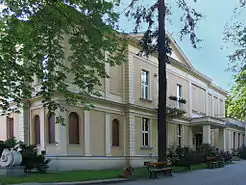National Film School in Łódź
The Leon Schiller National Film School (Polish: Państwowa Wyższa Szkoła Filmowa, Telewizyjna i Teatralna im. Leona Schillera) is the leading Polish academy for future actors, directors, photographers, camera operators and television staff. Founded on 8 March 1948 in Łódź (Lodz), it is the most prominent institutions of higher education in the city.
Państwowa Wyższa Szkoła Filmowa, Telewizyjna i Teatralna im. Leona Schillera | |
 Łódź Film School (Oskar Kon Palace) | |
| Established | 8 March 1948 |
|---|---|
| Rector | Milenia Fiedler |
| Students | ca. 1000 |
| Address | ul.Targowa 61, 90-323 , , |
| Affiliations | CILECT |
| Website | filmschool.lodz.pl film.lodz.pl |
History
Until 1958, the school existed as two separate schools: one for actors and the other for filmmakers. The schools and the Polish cinema industry were moved from Warsaw to the nearby city of Łódź after World War II. This move was initially seen as a temporary measure, thus the name of the actors' school was The National Higher School of Theatre in Warsaw with seat in Łódź. Its creator and the first rector was the renowned Polish actor Leon Schiller, current namesake of the school. In 1949, it was divided into two branches; one actually moved to Warsaw and the other one remained in Łódź under the directorship of Kazimierz Dejmek (since 1950).
The years leading up to the merger in 1958 were those in which notable artists of the Polish Film School created the reputation of the Łódź Film School as the most liberal and least Communist institution of higher education in Poland. Among the most notable alumni of that period were Andrzej Munk, Janusz Morgenstern, Andrzej Wajda, and Kazimierz Kutz. In 1954, they were joined by Roman Polanski.
After 1958, the school became one of the most notable cultural think-tanks of Poland, with many outsiders and artists not supported by the Communist authorities joining it. Various discussion clubs and relative liberty of speech promoted by the new rector, Jerzy Toeplitz, added to its value. For instance, two of the students of the university (Jerzy Matuszkiewicz and Witold Sobociński) became the first jazz musicians in Poland after World War II to be allowed by the authorities to organize a concert. Kirk Douglas visited the school in 1966. His visit was documented in the self-titled documentary Kirk Douglasy.[1]
After the events of March 1968, the period of liberty came to an end. Toeplitz was fired, as were most of the tutors. However, with the advent of Edward Gierek and his regime, the school once again started to bloom.
The School has three Oscar-winning alumni: Roman Polanski, Andrzej Wajda, and Zbigniew Rybczyński, while alumnus Krzysztof Kieślowski was nominated for an Oscar. Both Polanski and Wajda won the Palme d'Or at the Cannes Film Festival in 2002 and 1981, respectively.
Polish Internet Movie Database
The Internetowa Baza Filmu Polskiego (Polish Internet Movie Database) has been maintained by the School since 1998.[2]
Notable alumni
Directors
- Feliks Falk
- Dariusz Gajewski
- Kazimierz Karabasz
- Dorota Kędzierzawska
- Jan Kidawa-Błoński
- Krzysztof Kieślowski, nominated for an Academy Award, Golden Lion winner
- Jan Komasa, nominated for an Academy Award
- Grzegorz Królikiewicz
- Kazimierz Kutz
- Jan Łomnicki
- Jan Machulski[3]
- Juliusz Machulski
- Andrzej Munk
- Janusz Nasfeter
- Władysław Pasikowski
- Radosław Piwowarski
- Marek Piwowski
- Roman Polanski, Academy Award, BAFTA Award, Golden Globe and Palme d'Or winner
- Wojciech Kasperski
- Barbara Sass
- Jerzy Skolimowski, Golden Bear winner
- Piotr Szulkin
- Piotr Trzaskalski
- Robert Tutak[4]
- Andrzej Wajda, Academy Award and BAFTA Award and Palme d'Or winner
- Maciej Wojtyszko
- Krzysztof Zanussi, Golden Lion winner
- Emily Young, BAFTA Award winner
- Maria Sadowska[5]
- Urszula Urbaniak
Cinematographers
- Paweł Edelman, nominated for an Academy Award and BAFTA Award
- Sławomir Idziak, nominated for an Academy Award
- Edward Kłosiński
- Jan Jakub Kolski
- Krzysztof Ptak
- Zbigniew Rybczyński, Academy Award winner
- Przemysław Skwirczyński
- Piotr Sobociński, nominated for an Academy Award
- Witold Sobociński
- Dariusz Wolski
- Hubert Taczanowski
- Andrzej Bartkowiak
- Hoyte van Hoytema, nominated for an Academy Award and BAFTA Award winner
- Piotr Lenar
- Łukasz Żal, nominated for two Academy Awards, winner of the ASC award
See also
- Cinema of Poland
- Film Polski
- Polish Film School
- New York Polish Film Festival
- Seattle Polish Film Festival
- Analog photography
- Digital versus film photography
- History of cinema
- List of famous Poles
- List of film festivals
- List of film formats
- List of film techniques
- List of motion picture-related topics (Extensive alphabetical listing and glossary).
- List of photographic processes
- List of video-related topics
- Outline of film
References
- "Kirk Douglas (1966)" (in Polish). Filmweb. Retrieved June 25, 2020.
- "Internetowa Baza Filmu Polskiego". Państwowa Wyższa Szkoła Filmowa. Retrieved June 25, 2020.
- "Machulski - Polish famous actor, director passed away". thenews.pl. Polskie Radio. November 20, 2008. Archived from the original on January 15, 2009.
- "Robert Tutak". Brooklyn College. Retrieved June 25, 2020.
- "Maria Sadowska" (in Polish). FilmPolski.pl. Retrieved June 25, 2020.
External links
- Official website

- Official website of the Film Production Department (in Polish)
- Polish Internet Movie Database (in Polish)